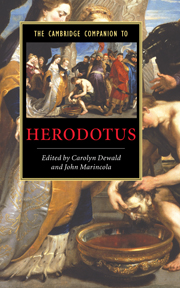Book contents
- Frontmatter
- Introduction
- 1 Herodotus and the poetry of the past
- 2 Herodotus and his prose predecessors
- 3 Herodotus and tragedy
- 4 The intellectual milieu of Herodotus
- 5 Meta-historiē: Method and genre in the Histories
- 6 The syntax of historiē: How Herodotus writes
- 7 Speech and narrative in the Histories
- 8 Herodotus, Sophocles and the woman who wanted her brother saved
- 9 Stories and storytelling in the Histories
- 10 Humour and danger in Herodotus
- 11 Location and dislocation in Herodotus
- 12 Herodotus and the natural world
- 13 Herodotus and Greek religion
- 14 Warfare in Herodotus
- 15 Herodotus, political history and political thought
- 16 Herodotus and the cities of mainland Greece
- 17 An alternate world: Herodotus and Italy
- 18 Herodotus and Persia
- 19 Herodotus and foreign lands
- 20 Herodotus' influence in antiquity
- Glossary
- Timeline
- Bibliography
- Index
- Series List
19 - Herodotus and foreign lands
Published online by Cambridge University Press: 28 January 2007
- Frontmatter
- Introduction
- 1 Herodotus and the poetry of the past
- 2 Herodotus and his prose predecessors
- 3 Herodotus and tragedy
- 4 The intellectual milieu of Herodotus
- 5 Meta-historiē: Method and genre in the Histories
- 6 The syntax of historiē: How Herodotus writes
- 7 Speech and narrative in the Histories
- 8 Herodotus, Sophocles and the woman who wanted her brother saved
- 9 Stories and storytelling in the Histories
- 10 Humour and danger in Herodotus
- 11 Location and dislocation in Herodotus
- 12 Herodotus and the natural world
- 13 Herodotus and Greek religion
- 14 Warfare in Herodotus
- 15 Herodotus, political history and political thought
- 16 Herodotus and the cities of mainland Greece
- 17 An alternate world: Herodotus and Italy
- 18 Herodotus and Persia
- 19 Herodotus and foreign lands
- 20 Herodotus' influence in antiquity
- Glossary
- Timeline
- Bibliography
- Index
- Series List
Summary
In the preface to his Histories, Herodotus promises to describe the great and wonderful deeds and monuments displayed both by Greeks and by non- Greeks as well as to explain why they fought against each other. He proceeds at once to what he claims is a Persian account of the origin of their disputes. The account attributed to the Persians turns out to be a sort of mythographic pastiche describing how enmity arose first when a Greek woman, Io, was seized by Phoenicians, and then from the seizure of three other women (Europa, Medea, and Helen). This Persian account of the origin of hostilities between Greeks and barbarians includes, among other notable features, the first ethnographic observation in Herodotus' Histories (1.4.4):
The Persians say that while they, on the Asian side, took no account of it when their women were seized, the Greeks gathered together a great army for the sake of a Spartan woman and then came to Asia and destroyed the power of Priam; and they think that the Greeks have always been hostile to them from that time. For the Persians regard Asia and the barbarian people living there as their own, but think that Europe and the Greeks are separate.
According to these Persians, clashes of cultural attitudes lie at the heart of the hostility between different nations. This observation is the first hint that a study of foreign customs will play its part in Herodotus' attempt to explain why Greeks and barbarians fought each other. But as Herodotus' work progresses, it becomes clear that his inquiry into foreign lands and peoples does far more than just underpin his explanation of the cultural conflicts that culminate in the great Persian invasions of Greece. Herodotus' inquiry into other lands and customs proves to be as centrcentral to his project as his inquiry into the wars fought by Greeks and non-Greeks.
- Type
- Chapter
- Information
- The Cambridge Companion to Herodotus , pp. 290 - 305Publisher: Cambridge University PressPrint publication year: 2006
- 13
- Cited by



